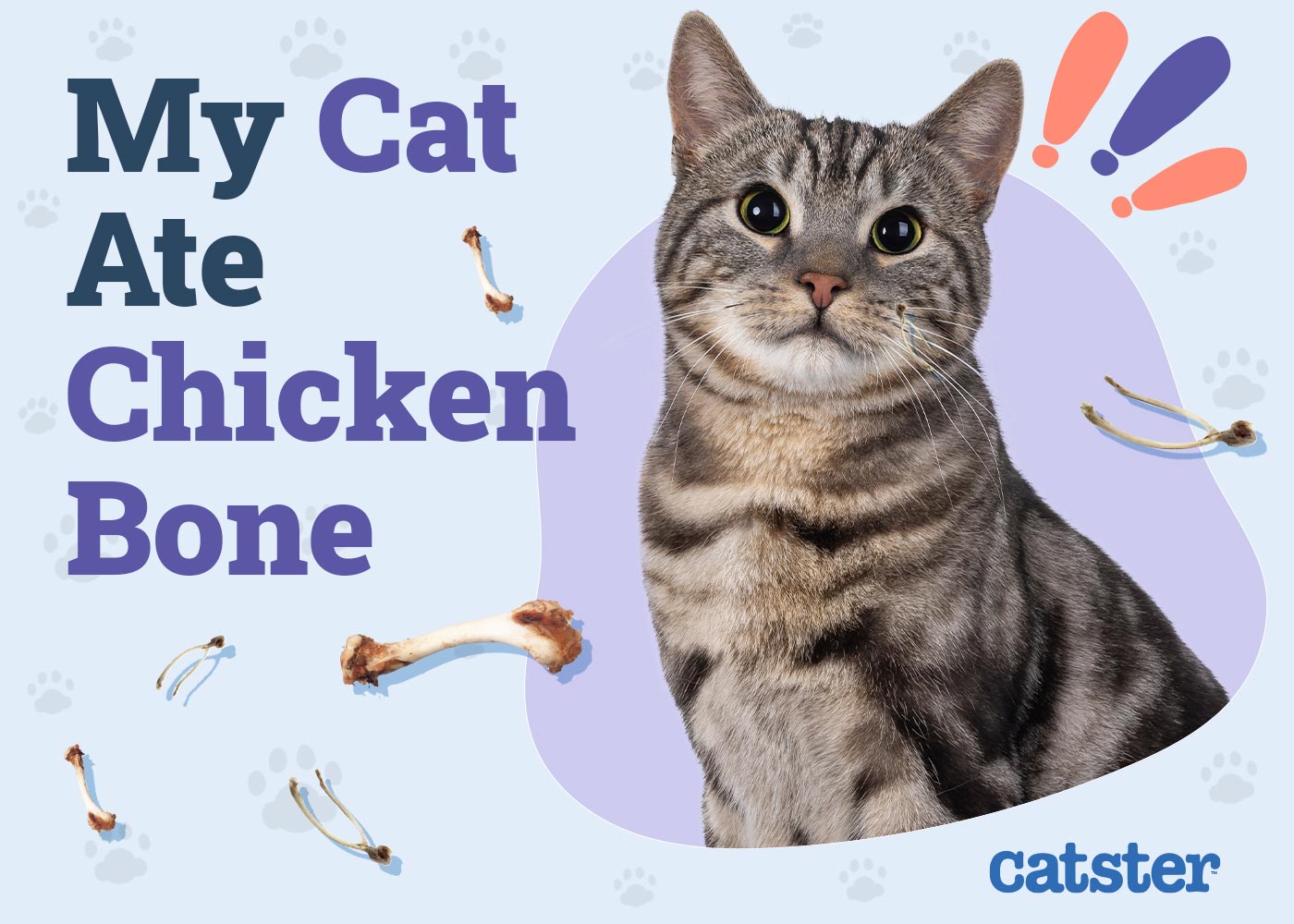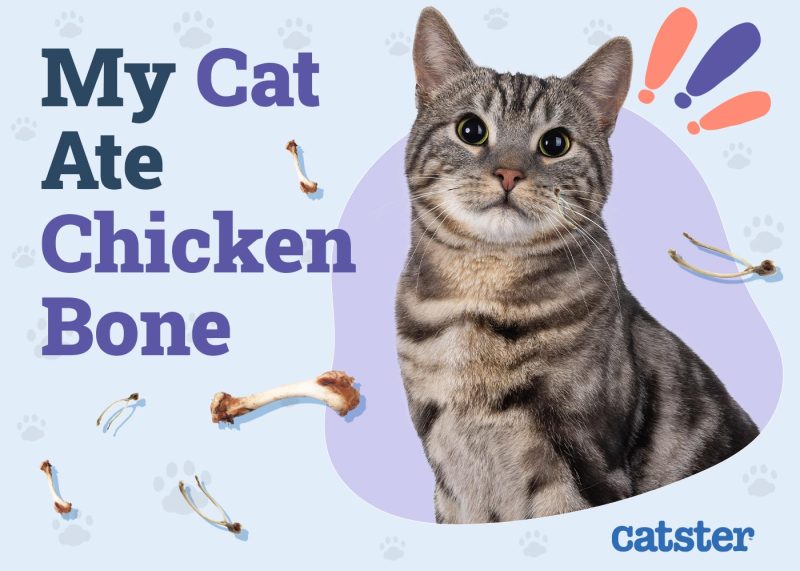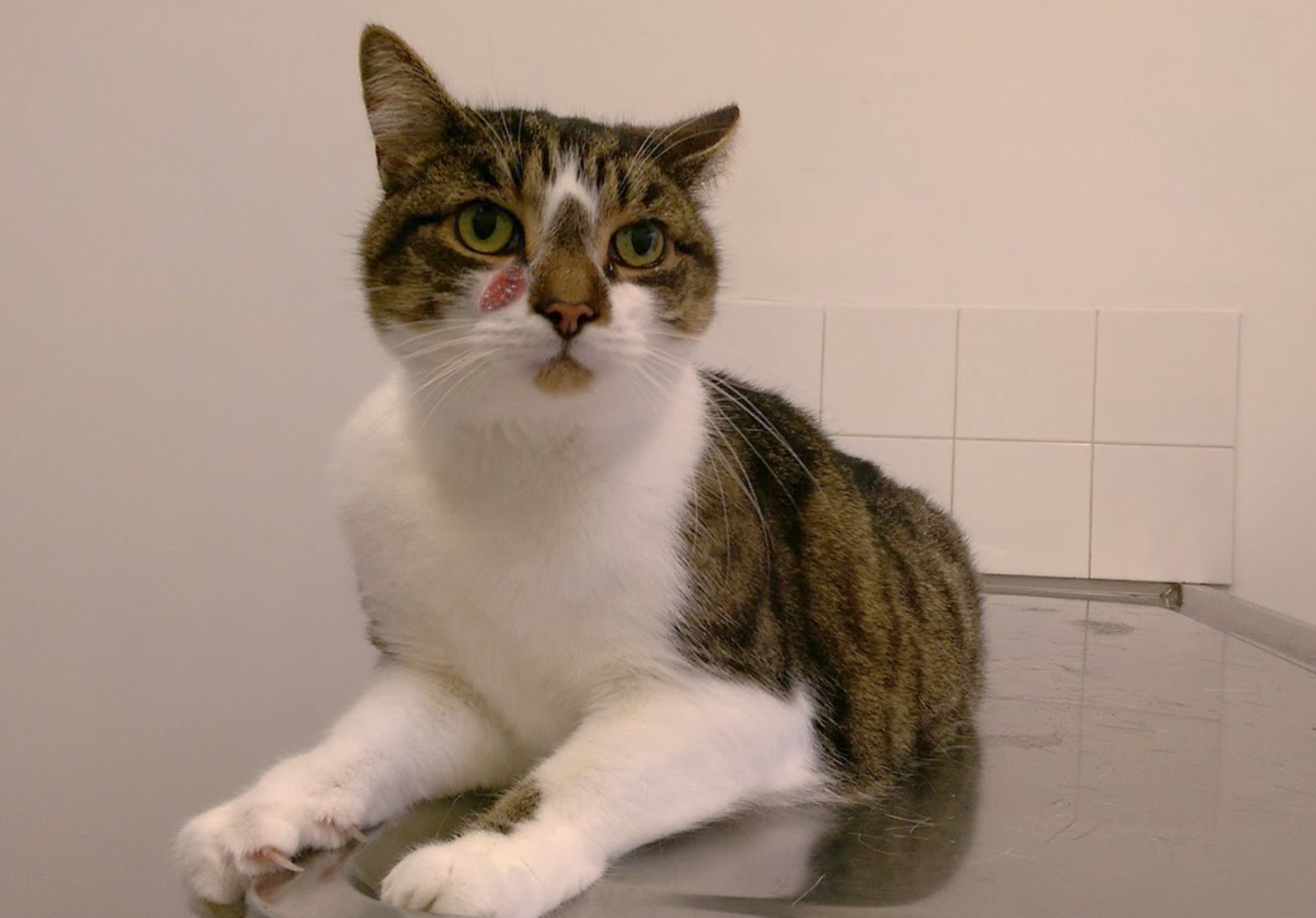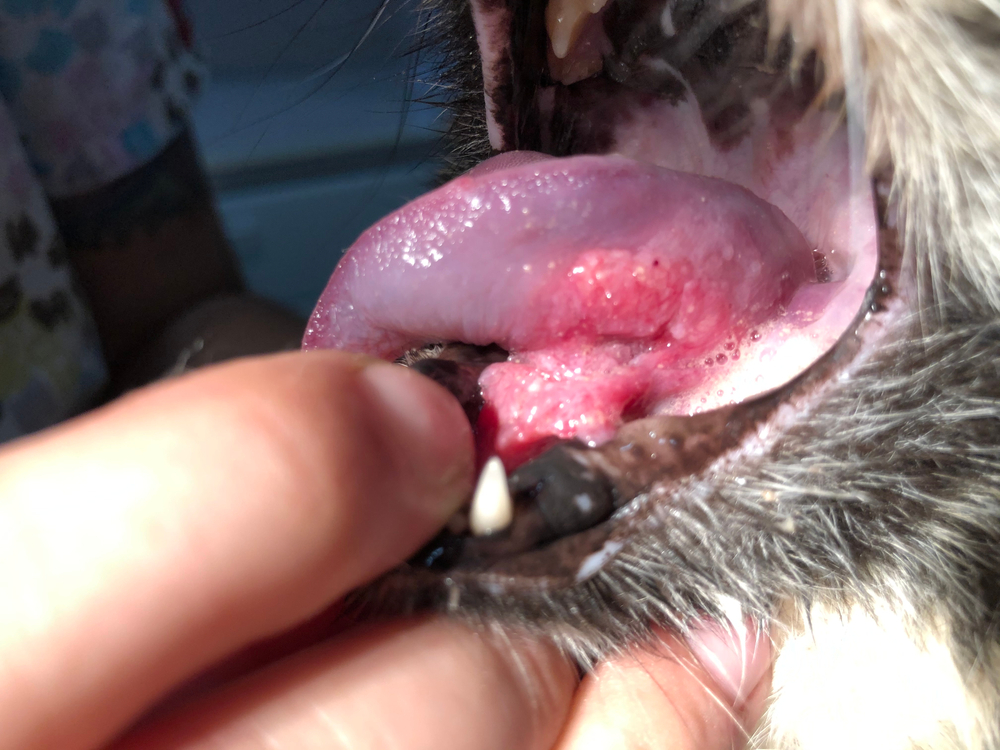Click to Skip Ahead
For most cats, a chicken bone is a temptation that’s hard to resist! Wild cats often consume their prey without removing the bones, but domesticated cats are unaccustomed to eating wild cat meals. So can cats eat chicken bones? Whether it is raw or cooked, there are risks associated with your cat eating bones. Read on to find out what to do if your cat has eaten a chicken bone.

The Dangers of Cats Eating Chicken Bones
Can cats eat bones? They are carnivores, so in theory, they should be able to digest bones, right? Well, that isn’t always the case, and the consequences of a cat eating a chicken bone can be life-threatening.
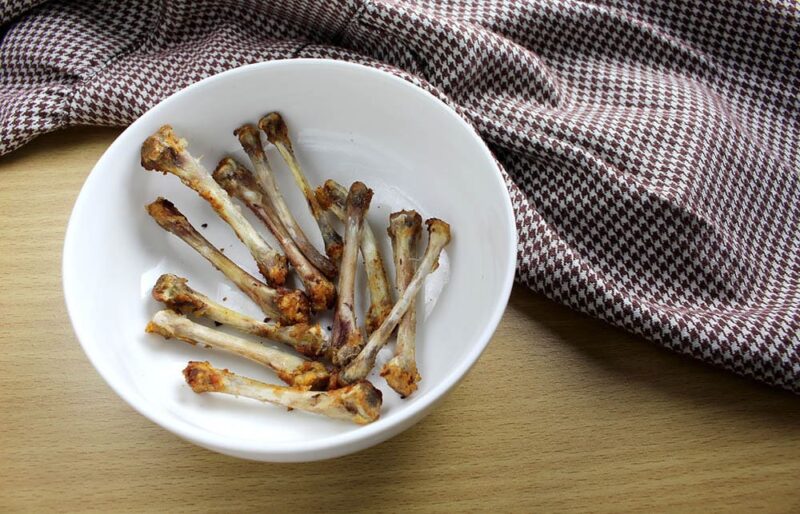
Blockages or tears in the gut
The most significant risk to your cat from eating a chicken bone is that he gets a blockage or a tear in his gastrointestinal tract. Either of these would require your cat to have major surgery, which can be risky.
A cooked bone is more dangerous for your cat than a raw bone. The heating process causes them to become brittle, which in turn makes them more likely to splinter into shards if your cat decides to munch on one. Not only could this cause a tear in your cat’s guts, but it also has the potential to damage your cat’s other internal organs by causing a puncture.
Choking
There is always the risk that your cat could choke on a bone as he tries to eat it. If a bone accidentally becomes lodged in his airway, it could result in him struggling to breathe, and he could even suffocate.
Smaller bones can also become stuck across the roof of your cat’s mouth, which they are then unable to remove. This is, at best, uncomfortable for your cat, but it can also cause an injury to the soft tissues in your cat’s mouth. If that happens, your cat may be unable to fully close his mouth or shake his head violently to dislodge the bone. Call your veterinarian if you suspect this has happened.
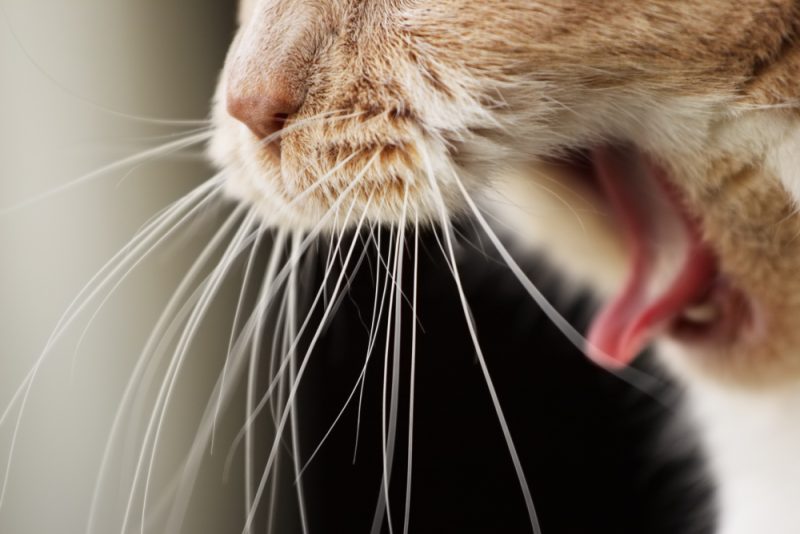
Bacteria & illness
Raw chicken bones can carry dangerous bacteria such as salmonella or campylobacter, which could cause your cat to become unwell. In addition, these bacteria are known as ‘zoonoses,’ which means they are transmittable to humans from animals.
Once your cat is infected, these food-poisoning bacteria could be shed in his saliva and feces for many months afterward, posing a risk to any humans he comes into contact with. Children, the elderly, and the immunosuppressed are the most vulnerable, but salmonella and campylobacter can cause serious illness even in a young, otherwise healthy adult.
My Cat Ate a Chicken Bone – What Do I Do?
If your cat ate a chicken bone, the most important thing to do is make your veterinarian aware and follow their advice. Their advice will be tailored to your cat and his specific circumstances. However, there are a few general advice points to follow:
- Check your cat’s breathing – Make sure that your cat is breathing normally and seems normal. Sometimes bones can become stuck in your cat’s mouth or at the back of his throat.
- Prevent your cat from eating any more chicken bones – Put your cat somewhere safe where the chicken bones are out of reach. Make sure he can’t escape; in case you need to take him to the vet
- Call your veterinarian – If you are able, tell them how many chicken bones you think your cat has eaten, whether they were cooked or raw, and how long ago they ate them. Be sure to tell them if your cat has any signs of illness.

If you need to speak with a vet but can’t get to one, head over to PangoVet. It’s an online service where you can talk to a vet online and get the personalized advice you need for your pet — all at an affordable price!
Never attempt to make your cat sick if he eats a chicken bone. A bone could get stuck somewhere as he brings it back up, which could either cause him to choke or cause a life-threatening tear in his stomach or esophagus (food pipe).
What Happens if a Cat Eats a Chicken Bone?
If he is lucky, your cat will digest the chicken bone without any problems. Even if he digests the bone, he might still get an upset tummy resulting in diarrhea. If he doesn’t digest the bone, it could become stuck somewhere in his gut, either causing a blockage or a tear, or both. Always contact a veterinarian for tailored advice as soon as you know your cat has swallowed a chicken bone.
In particular, contact your veterinarian immediately if your cat has eaten a chicken bone and is showing any of the following signs:
- Vomiting
- Sitting hunched up or growling when you touch his tummy
- Isn’t passing feces
- Has a bloated tummy
- Not eating or drinking
- Acting lethargic (having less energy than he normally would)
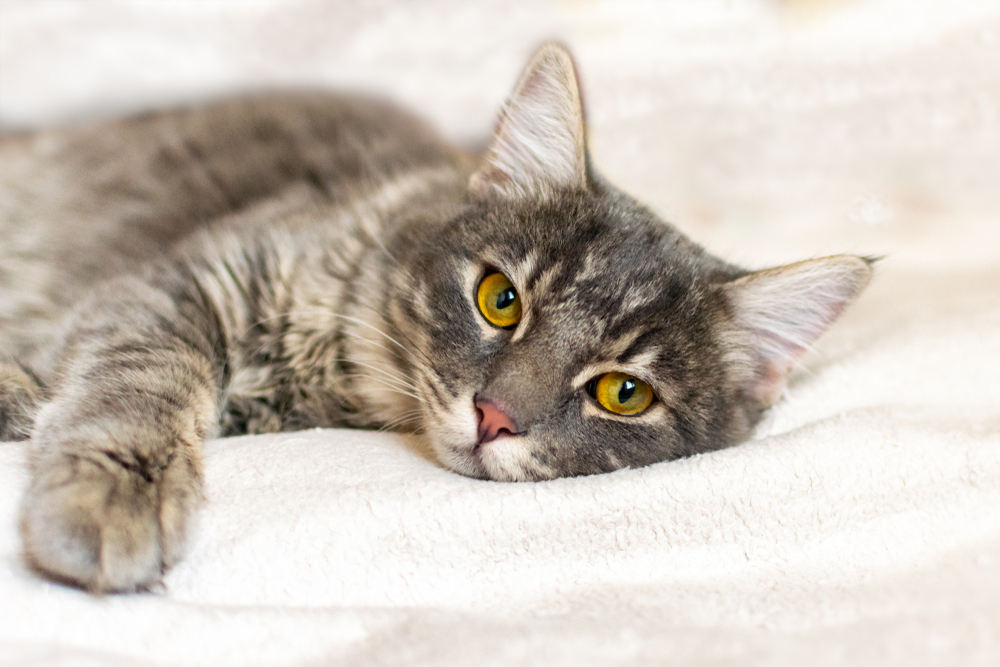

How Do You Treat a Cat That Ate a Chicken Bone?
If your cat has eaten a chicken bone, your veterinarian might suggest further tests to check where the bone is, its size, and whether or not it is likely to cause problems. This will probably involve x-rays of your cat’s abdomen.
Your veterinarian may decide your cat just needs monitoring. If he is showing signs of illness, he might need monitoring in the hospital, but if he seems okay, you can usually monitor him at home. Always follow your veterinarian’s advice and ensure you understand any signs to watch out for.
Assuming your vet says it’s okay, some general advice for home monitoring of a cat that has eaten a chicken bone would be to:
- Food: Feed a bland food (for example, a canned gastrointestinal diet from your vet). This will encourage your cat to digest the bone and may also help cushion any sharp edges that the bone has as it passes through your cat’s gut.
- Water: Ensure he has access to plenty of fresh water to prevent dehydration.
- Monitor your cat’s stools carefully to check for bone fragments and ensure they continue to be expelled in the feces. If they stop producing feces or produce less than they normally would, it can be one of the signs of a blockage.
If your veterinarian suspects a blockage or a tear in your cat’s gastrointestinal tract, your cat will require major surgery to remove the blockage and repair the damage if necessary. He will then require intensive hospitalization for a few days afterward and may not fully recover for a few weeks. In the worst cases, recovering after a cat has eaten a chicken bone is not always possible.
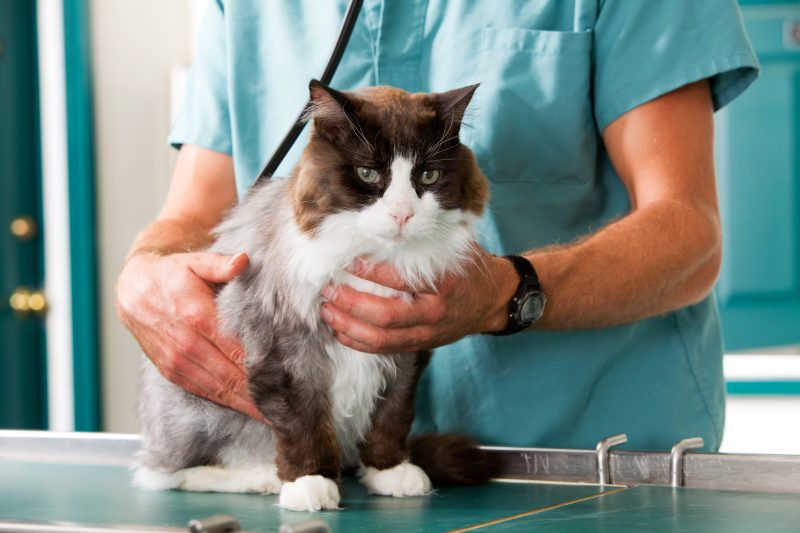
How Much Is Cat Chicken Bone Surgery?
This will vary significantly depending on the extent of surgery your cat needs, how long he needs to stay in the hospital, what type of medications he requires, and other factors. The cost of surgery could range anywhere from $800–$7,000. Your veterinarian can give you a more precise estimate depending on your cat’s circumstances.

Frequently Asked Questions (FAQ)
Will My Cat Be Ok if He Ate a Chicken Bone?
Some cats might be lucky and digest the bone without side effects or have a mild tummy ache for a few days. If the chicken bone causes a blockage or a tear in your cat’s gut, your cat is likely to require surgery, and even then, there is a chance that your cat may not survive. The earlier the blockage is treated, the better your cat’s prognosis. Always inform your veterinarian immediately If your cat has eaten a chicken bone so they can give you the best advice.
Cats that are very old or very young, or cats that are receiving medication to lower the amount of stomach acid they produce, are likely to be more prone to complications. Your veterinarian will be able to advise you further on this.
Can a Cat Die From Eating a Chicken Bone?
Yes, there is a chance that a cat could die from eating a chicken bone. There are several significant risks associated with your cat eating a chicken bone. The bone could either become lodged in the throat and cause your cat to choke, or it could cause irreversible damage to your cat’s intestines.
How Do I Stop My Cat From Eating Chicken Bones?
The best way to prevent your cat from eating chicken bones is to prevent them from having access to them in the first place! Ensuring cooked chicken bones are disposed of in a secure bin is essential since they pose the most significant risk and are likely to be the most appealing to your cat!
- NO MESS - The 360° tray on this cat food and water bowl set has a raised design to catch and...
- WHISKER FRIENDLY - Shallow and wide metal containers with flat bottoms ensure your kitty can enjoy...
- CHEW-SAFE MATERIALS - Kittens and cats love chewing on silicone and soft rubber - but it's a choking...
Learning about what your cat can and cannot eat is a crucial part of keeping them happy and healthy! Choosing a bowl to serve cat-friendly foods in is another important decision pet owners face. Satisfy the specific needs of your cat with the innovative design of the Hepper NomNom Cat Bowl. Learn why it’s our (and our cats!) favorite food and water dish here.
At Catster, we’ve admired Hepper for many years and decided to take a controlling ownership interest so that we could benefit from the outstanding designs of this cool cat company!
Final Thoughts
So in conclusion, can cats eat chicken bones? No, in most cases, they cannot, and if you suspect your cat has eaten a chicken bone, the best thing you can do is contact your veterinarian for help. Your vet can give you advice, but in some cases, you’ll have to visit their office for an examination. The sooner your cat receives appropriate treatment, the more likely he is to recover and return to his usual mischief!
Related Reads:
Featured Image Credit: sheris9, Shutterstock

